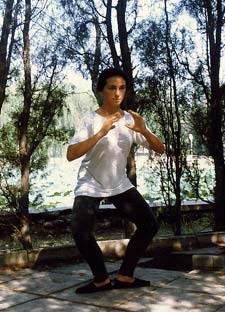
The aim is to promote the flow of Qi in the body, and so increase vitality and flexibility, promoting relaxation and the healing of disease. Qi is divided into two polar opposite states of being, Yin and Yang, which fluctuate, causing imbalance which can lead to illness. When these are in harmony, physical and emotional health is achieved.
What are the benefits?
Qigong practitioners claim that it can help almost any disease. Better overall heath, lowered blood pressure, improved circulation and a reduction in stress are all commonly cited as benefits. Back and arthritic and pain can also be alleviated by qigong, it’s said.
What does it involve?
Qigong falls broadly into two categories: “soft” and “hard”. The former focuses on breathing exercises and meditation. The latter includes highly-controlled exercises such as t’ai chi and aims to strengthen the body as well as the mind.
Classes can be one-to-one or in groups, and students are required to wear comfortable clothes and flexible shoes. The teacher then helps the students to channel their mind or “intention” into the postures, which are easy to learn.
Who does it?
In China, qigong is taught in schools and used in clinics and hospitals. In Britain, there is no umbrella association, but qigong is often available from holistic health centres where t’ai chi is taught. Cost can vary from £6 for a group class to £40 for personal tuition.
